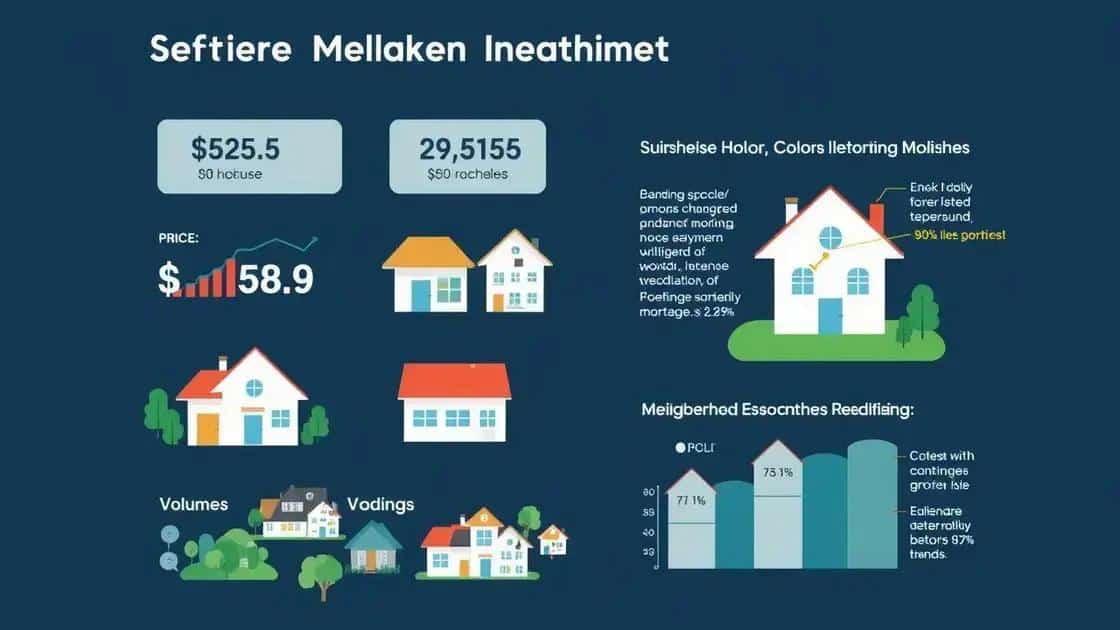Housing market crash warnings: Are you prepared?

Anúncios
Housing market crash warnings involve recognizing key indicators such as declining prices, rising interest rates, and increased inventory, allowing investors to make informed decisions to protect their assets.
Housing market crash warnings are crucial for anyone looking to invest or stay informed about their assets. With recent fluctuations, it’s natural to wonder how they might impact your financial future. Let’s dive into the essential signs and strategies.
Anúncios
Understanding the signs of a housing market crash
Understanding the signs of a housing market crash is essential for anyone involved in real estate. By recognizing early warning signs, you can take proactive measures to protect your investments. The housing market can be volatile, and knowing what to look for is crucial.
Key Indicators to Watch
Several indicators can signal an impending housing market crash. These include fluctuations in home prices, rising interest rates, and increasing inventory of unsold homes. Keeping an eye on these trends can give you a heads-up about potential issues in the market.
Anúncios
- Fluctuating Home Prices: A sudden drop or slowing increase in home prices can indicate market instability.
- Rising Interest Rates: Higher interest rates make mortgages more expensive, reducing buyer affordability.
- Increased Inventory: A rise in the number of unsold homes may suggest that demand is waning.
- Changing Economic Conditions: Economic downturns or high unemployment rates can affect housing demand.
Additionally, monitoring consumer confidence in the real estate market is vital. If people feel uncertain about the economy, they may hesitate to purchase homes. This can lead to a decline in demand, signaling a potential crash.
The Impact of Speculation
Speculation in the real estate market can also lead to instability. When prices rise too quickly due to speculative buying, a bubble may form. If prices suddenly drop, this bubble bursts, contributing to a crash. It’s essential to stay informed and cautious during periods of rapid price increases.
Investors and homeowners alike should watch for these warning signs. By being proactive and informed, you can make better decisions and safeguard your investments in the housing market.
Historical patterns of housing market crashes
Understanding the historical patterns of housing market crashes helps us prepare for future uncertainties. By examining past events, we can identify key signals that often lead to market downturns. This knowledge can empower investors and homeowners to make informed decisions.
Major Crashes in History
Several significant housing crashes have shaped today’s market. Notable examples include the Great Depression in the 1930s and the 2008 financial crisis. During these times, descending home values and increased foreclosures marked the collapse of the housing market.
- The Great Depression: A severe economic downturn led to widespread unemployment and plummeting home prices.
- The 2008 Financial Crisis: This triggered a significant decline in home values, largely due to subprime mortgage failures.
- Regional Crashes: Markets sometimes crash due to local economic conditions, affecting specific areas instead of the national market.
- Post-War Boom and Busts: Periods of rapid growth followed by corrections illustrate how fluctuations can impact housing.
Each of these events had unique causes, yet they shared common characteristics. For instance, over-speculation was often a factor, where investors bought homes anticipating rising prices without sufficient demand. This speculative behavior creates bubbles that eventually burst.
Indicators from the Past
Studying previous crashes reveals useful indicators. For example, rising interest rates typically lead to declining affordability, which can reduce buyer interest and create downward pressure on prices. Observing rising inventory levels compared to sales can also warn of potential slowdowns. Furthermore, changes in lending standards play a crucial role. When banks extend loans too easily, it can lead to unsustainable growth.
Recognizing these patterns assists homeowners and investors in taking precautionary actions. By staying alert to these signals, one can navigate potential risks more effectively. Overall, learning from history can provide valuable insights for future decision-making in the ever-changing housing market.
Key indicators to monitor

Monitoring key indicators is vital in understanding the housing market dynamics. By focusing on specific metrics, you can effectively gauge the market’s health and anticipate potential downturns. Let’s delve into some of the essential signs that can guide your decisions.
Important Metrics
Several key indicators provide valuable insights into the real estate market. These metrics include housing prices, mortgage rates, and sales figures. Paying attention to these figures can help you understand the current state of the market.
- Home Prices: A sharp increase or decrease in home prices can indicate market instability. Consistent declines in prices may signal a crash.
- Mortgage Interest Rates: Rising rates can lead to decreased affordability, impacting buyer demand and potentially causing prices to fall.
- Sales Volume: Monitoring the number of homes sold can show demand fluctuations; a decline in sales often precedes a market downturn.
- Days on Market: If homes take longer to sell, it could indicate weakening demand. A rise in the average days on the market often precedes price drops.
In addition to these, keeping an eye on new building permits is essential. When builders slow down construction, it often reflects anticipated declines in demand. Furthermore, the availability of jobs in an area can significantly influence housing markets. Regions with strong job growth typically see increased housing demand, while areas facing job losses may experience the opposite.
Local Market Trends
Local trends also provide insights into the market. For instance, observe how different neighborhoods perform. Some might sustain their value while others decline. Monitoring local economic health and demographic changes in specific areas can help you refine your analysis. An area that becomes popular can lead to rising prices, while declining neighborhoods can signal risks for investors.
By vigilantly tracking these key indicators, you can make informed decisions about buying, selling, or holding onto properties. Staying proactive can help protect your investments and guide your strategy in a fluctuating housing market.
Strategies for protecting your investments
Protecting your investments in the housing market requires strategic planning and proactive measures. By implementing certain strategies, you can safeguard your assets against potential downturns. Here are effective approaches to consider.
Diversification
Diversification is one of the best ways to protect your investments. Rather than putting all your money into one property or area, consider spreading your investments across different types of real estate. This may include residential, commercial, or rental properties in various locations. Diversifying helps mitigate risks. If one market faces a downturn, others may remain stable or even thrive.
- Invest in Different Property Types: Explore various real estate sectors like single-family homes, apartments, and commercial properties.
- Consider Different Locations: Invest in diverse markets, including urban and suburban areas, to balance risks.
- Use REITs: Real Estate Investment Trusts can provide exposure to real estate without the need to own physical properties.
Stay Informed
Another essential strategy is to stay informed about market trends and economic indicators. Regularly review reports on housing prices, interest rates, and local market conditions. Additionally, understanding broader economic trends helps you adjust your strategy accordingly. Subscribe to industry newsletters or follow trusted online sources for timely updates.
Being well-informed allows you to respond quickly to changes. For example, if you notice rising interest rates, you might consider locking in low mortgage rates before they increase further. Keeping a close eye on the market can help you make smarter investment choices.
Emergency Fund
Establishing an emergency fund specific to your real estate investments is a crucial step. This fund should cover unexpected expenses, such as repairs or maintenance. Having a financial cushion allows you to navigate downturns without having to sell properties at unfavorable prices.
Additionally, consider obtaining adequate insurance coverage for your properties. Protecting your investments against unforeseen events can save you significant costs and stress.
Collaborate with Professionals
Finally, working with real estate professionals can provide you with valuable insights and advice. Real estate agents, financial advisors, and property managers can help you make informed decisions. Their expertise can guide you through market fluctuations and assist you in buying or selling properties at the right time.
By implementing these strategies, you can better protect your investments in the housing market, ensuring that you’re prepared for any challenges that may arise.
What to do when a crash happens
When a housing market crash occurs, it’s crucial to understand the best steps to take. Knowing how to respond can help mitigate losses and protect your investments. Here’s what to do when facing a crash.
Assess Your Situation
First, take a moment to assess your current financial position. Evaluate your assets, liabilities, and cash flow. Understanding how a crash affects your investment portfolio will guide your next actions. This includes reviewing property values, rental income, and any outstanding mortgages. If your properties are underwater, facing foreclosure, or losing value, determining the impact on your total financial health is key.
Stay Calm and Informed
In times of crisis, it’s essential to stay calm. Fear can lead to hasty decisions that may worsen your situation. Stay informed about the market trends and economic climate. Regularly check credible news sources and market analysis to gather relevant information. This can help you make informed decisions instead of reacting impulsively.
- Monitor Market Conditions: Keep an eye on fluctuations in property values and sales volume.
- Review Economic Indicators: Look for signs of recovery or further decline in the economy.
- Seek Professional Advice: Consider consulting financial or real estate experts to provide insights into your situation.
Consider Your Options
Explore various options available for handling your property. Depending on your situation, you may choose to sell your property or hold it as a long-term investment. Selling may reduce losses, especially if the home value is dropping. However, if you can hold through the downturn, the market may recover over time, allowing your property value to increase again.
Another option is to refinance your mortgage if interest rates are lower than your current rate. This can help reduce monthly payments and make owning your property more affordable, even in a downturn.
Enhance Property Value
While managing a potential loss, consider ways to enhance your property’s value. Simple renovations or improvements can increase appeal to future buyers or renters. Keeping your property well-maintained and making necessary updates can prevent additional depreciation.
Ultimately, navigating a housing market crash requires a thoughtful approach. By assessing your finances, staying informed, and exploring your options, you can protect your investments effectively and be better prepared for recovery.
FAQ – Questions About Housing Market Crashes
What are key indicators of a housing market crash?
Key indicators include rising interest rates, declining home prices, increased inventory of unsold homes, and a drop in sales volume.
How can I protect my investments during a crash?
To protect your investments, diversify your portfolio, stay informed about market trends, and possibly hold off on selling unless necessary.
What should I do if my property’s value drops?
If your property’s value drops, assess your financial situation, consider making improvements, and avoid panic selling.
Is it a good time to buy during a crash?
Buying during a crash can be beneficial if you have the financial stability, as properties may be undervalued and present great opportunities.






